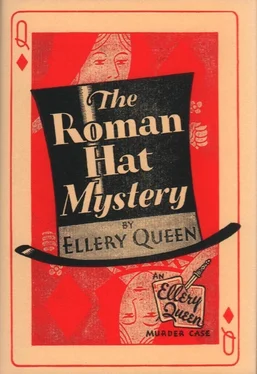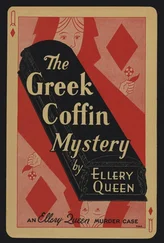The Inspector shifted restlessly. “This makes clear, I hope, just how Barry did the job. As for our investigation... With the hat deductions made and our knowledge of the murderer’s identity, we still had no inkling of the exact circumstances behind the crime. If you’ve been keeping in mind the material evidence which we had collected on Thursday night, you will see that we had nothing at all with which to work. The best thing we could hope for was that somewhere among the papers for which all of us were looking was a clue which would tie up to Barry. Even that would not be enough, but... So the next step,” said the Inspector, after a sigh, “was the discovery of the papers in Field’s neat hiding place at the top of the bed canopy in his apartment. This was Ellery’s work from start to finish. We had found out that Field had no safety-deposit box, no post-office box, no outside residence, no friendly neighbor or tradesman, and that the documents were not in his office. By a process of elimination Ellery insisted that they must be somewhere in Field’s rooms. You know how this search ended — an ingenious bit of pure reasoning on Ellery’s part We found Morgan’s papers; we found Cronin’s stuff relating to the gang activities — and by the way, Tim, I’m going to be keenly alive to what happens when we start on the big clean-up — and we found finally a wad of miscellaneous papers. Among these were Michaels’ and Barry’s... You’ll remember, Tim, that Ellery, from the handwriting analysis business, deducted that possibly we would find the originals of Barry’s papers — and so we did.
“Michaels’ case was interesting. That time he went to Elmira on the ‘petty larceny’ charge, it was through Field’s clever manipulations with the law. But Field had the goods on Michaels and filed the documentary evidence of the man’s real guilt away in his favorite hiding place, in the event that he might wish to use it at some future date. A very saving person, this Field... When Michaels was released from prison Field used him unscrupulously for his dirty work, holding the threat of those papers over the man’s head.”
“Now Michaels had been on the lookout for a long time. He wanted the papers badly, as you may imagine. At every opportunity he searched the apartment for them. And when he didn’t find them time after time, he became desperate. I don’t doubt that Field, in his devilishly sardonic way, enjoyed the knowledge that Michaels was ransacking the place day after day... On Monday night Michaels did what he said he did — went home and to bed. But early Tuesday morning, when he read the papers and learned that Field had been killed, he realized that the jig was up. He had to make one last search for the papers — if he didn’t find them, the police might and he would be in hot water. So he risked running into the police net when he returned to Field’s rooms Tuesday morning. The story about the check was nonsense, of course.”
“But let’s get on to Barry. The original papers we found in the hat marked ‘Miscellaneous’ told a sordid story. Stephen Barry, to make it short and ugly, has a strain of negroid blood in his veins. He was born in the South of a poor family and there was definite documentary evidence — letters, birth records and the like — to prove that his blood had the black taint. Now Field, as you know, made it his business to run things like this to earth. In some way he got hold of the papers, how long ago we can’t say, but certainly quite a while back. He looked up Barry’s status at the time and found him to be a struggling actor, on his uppers more often than he was in funds. He decided to let the fellow alone for the time. If ever Barry came into money or in the limelight, there would be time enough to blackmail him... Field’s wildest dreams could not have foreseen Barry’s engagement to Frances Ives-Pope, daughter of a multi-millionaire and blue-blood society girl. I needn’t explain what it would have meant to Barry to have the story of his mixed blood become known to the Ives-Popes. Besides — and this is quite important — Barry was in a constant state of impoverishment due to his gambling. What money he earned went into the pockets of the bookmakers at the racetrack and in addition he had contracted enormous debts which he could never have wiped out unless his marriage to Frances went through. So pressing was his need, in fact, that it was he who subtly urged an early marriage. I have been wondering just how he regarded Frances sentimentally. I don’t think, in all fairness to him, that he was marrying wholly because of the money involved. He really loves her, I suppose — but then, who wouldn’t?”
The old man smiled reminiscently and went on. “Field approached Barry some time ago with the papers — secretly, of course. Barry paid what he could, but it was woefully little and naturally did not satisfy the insatiable blackmailer. He kept putting Field off desperately. But Field himself was getting into hot water because of his own gambling and was ‘calling in’ his little business deals one by one. Barry, pushed to the wall, realized that unless Field were silenced everything would be lost. He planned the murder. He saw that even if he did manage to raise the $50,000 Field demanded — a palpable impossibility — and even if he did get the original papers, yet Field might still wreck his hopes by merely circulating the story. There was only one thing to do — kill Field. He did it.”
“Black blood, eh?” murmured Cronin. “Poor devil.”
“You would scarcely guess it from his appearance,” remarked Sampson. “He looks as white as you or I.”
“Barry isn’t anywhere near a full-blooded Negro,” protested the Inspector. “He has just a drop in his veins — just a drop, but it would have been more than enough for the Ives-Popes... To get on. When the papers had been discovered and read — we knew everything. Who — how — why the crime was committed. So we took stock of our evidence to bring about a conviction. You can’t hale a man into court on a murder charge without evidence... Well, what do you think we had? Nothing!
“Let me discuss the clues which might have been useful as evidence. The lady’s purse — that was out. Valueless, as you know... The source of the poison — a total failure. Incidentally, Barry did procure it exactly as Dr. Jones suggested — Jones, the toxicologist. Barry bought ordinary gasoline and distilled the tetra ethyl lead from it. There was no trace left... Another possible clue — Monte Field’s hat. It was gone... The extra tickets for the six vacant seats — we had never seen them and there seemed little chance that we ever would... The only other material evidence — the papers — indicated motive but proved nothing. By this token Morgan might have committed the crime, or any member of Field’s criminal organization.”
“Our only hope for bringing about a conviction depended upon our scheme to have Barry’s apartment burglarized in the hope that either the hat, or the tickets, or some other clue like the poison or the poison apparatus, would be found. Velie got me a professional housebreaker and Barry’s apartment was rifled Friday night while he was acting his role in the theatre. Not a trace of any of these clues came to light. The hat, the tickets, the poison — everything had been destroyed. Obviously, Barry would have done that; we could only make sure.”
“In desperation, I called a meeting of a number of the Monday night audience, hoping that I would find someone who remembered seeing Barry that night. Sometimes, you know, people recall events later which they forgot completely in the excitement of a previous quizzing. But this too, as it happened, was a failure. The only thing of value that turned up was the orangeade boy’s testimony about seeing Field pick up an evening bag in the alley. This got us nowhere as far as Barry was concerned, however. And remember that when we questioned the cast Thursday night we got no direct evidence from them.”
Читать дальше












